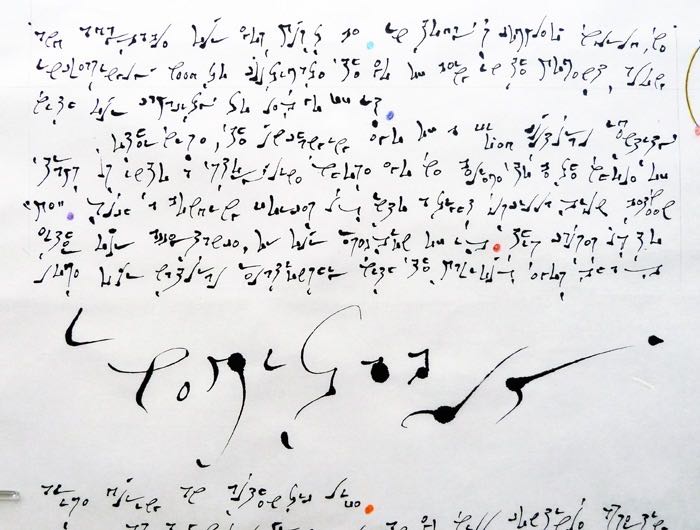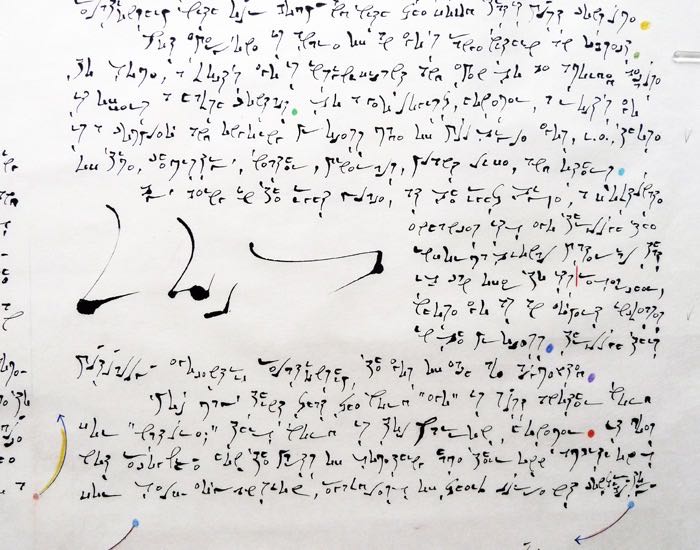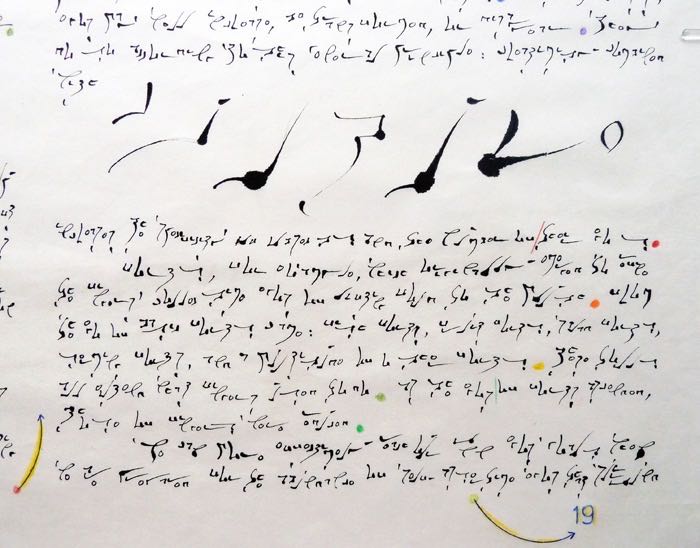Buy HD e-Books & Text —— www.ccelian.com
the Art of Nao
Scrolls: 1 . 2a . 2b . 3 . 4 . 5 . 6 . 7 . 8 . 9 . 10 . 11 . 12 . 13 . 14 . 15 . 16 . 17 .
18 . 19 . 20 . 21 . 22 . 23 . 24 . 25 . 26 . 27 . 28 . 29 . 30 . 31 . 32 . 33 . 34 .
< Scroll 17 ____________________________________________________ Scroll 19 >


66 x 133 cm / 26 x 53 inches
________________________

Scroll 18-section 1.1
> of the “non-ego.” To take a position against having an ego itself has an ego—and a rather large one at that.
Whereas an ego asserts: “I am” in association with something specific, a non-ego endlessly asserts “I am not that, nor that, nor that,” ad infinitum. In effect, the size of the non-ego increases with each ego that it is not. Since, regardless of context, it denies the concept of ego itself, a non-ego has a virtual infinity of material with which to associate itself by disassociation.
The ego of identification also has a lot of choices and can merge with many other egos. For example, we eagerly identify with the egos of luxuries and seek to possess them so as to add their egos to our own.
_____________

Scroll 18-section 1.2
In the opposite direction from an attraction to status-elevating egos, people generally distance themselves from linking to the egos of subjects viewed as lower. There are exceptions, as when people help those with weaker egos and strengthen their own in the process (philanthropy, volunteerism, social work, and so on.)
Some things have a very sizable and long-term ego by virtue of what they are (vital resources, cultural traditions, the "classics") while others have a short-lived ego because it was artificially enlarged to begin with (a fad).
The reduction of one’s ego is commonly, yet inappropriately, urged for spiritual self-improvement. Having an ego is not by itself a problem, since only its character determines if it is harmful to self or others.
Rather, egos are necessary engines and—in connection with humans—highly >
_______________

Scroll 18-section 2.1
> effective facilitators in the pursuit of ideals. You would cultivate neither understanding nor compassion if you did not recognize these qualities’ valuable egos and wish to add them to your own.
The ego of pride is, likewise, not a malignant one; only its duration is the problematic component. Like a launched rocket, pride’s initial momentum of elevation has only so much thrust to take us only so far. Beyond that, pride has spent its fuel and, unless we have already chosen to land, we must fall.
If people would be proud for only a while, then the ego of pride would have done its best job: that of encouraging us to engage in quests for quality and achievements. Otherwise, if we did not have a chance to feel proud of our accomplishments, we would lack a much-needed reinforcement to make similar efforts in the future.
_________________

Scroll 18-section 2.2
With all these egos acting out to their highest capacities, it might appear that egos are important. Egos are neither that, nor trivial, but necessary. Without them, nothing would have enough self-assertion to force its existence into persistence—there would be no motions and so, no change.
Not only can we embrace having a personal ego, but we will also need it as a guide towards our objectives. Further, the more we want to fulfill our potential, the more flexible >
___________________

Scroll 18-section 3.1
> and adaptable our egos must be. In today’s complex world, we increasingly need to cultivate the ego of being in the moment, along with our capacity to let go of it.
Otherwise, the unchanging ego of a fixed cultural identity traps us into a storyline whose ego we believe to be the whole of ”me”. Such a bonding forces us into a tight oscillation between either our acceptance, or our rejection of it. This causes us to lose our natural relationship with the various egos that inevitably arise during an authentic life.
_______________

Scroll 18-section 3.2
As a general principle, an ego will continue asserting itself until someone, or something, applies its own ego and establishes a different hierarchy. Over time, the egos of some actions can take us over in the process of our unavoidable engagement with them. We then serve the ego of the action rather than that of our self-interests. Eating is an example.
Of the many ways in which people become lost in the ego of something, eating is a particularly poignant one because we all have to do it—and frequently. Consequently, eating’s ego can seduce us to such an extent that we eat disproportionally. The key to dissolving this ego is to focus on our vision of a >
_______________

Scroll 18-section 4.1
> healthy self.
The more we stay in touch with our feelings at the simple idea of being in shape, the more we strengthen the ego of our physicality’s ideal. This approach is more effective than to circle around what we shouldn’t be eating because doing so still feeds the ego of eating, for whom there is no such thing as bad press.
Instead, if we repeatedly cultivate the ego of our desire for wellbeing, then moderation in eating cannot avoid establishing itself, regardless of the dietetic process that it takes to get there. The nourishment of that ideal is the surest road to finding a peaceful relationship with our body and with the food that it must consume.
_____________

Scroll 18-section 4.2
Not everyone is aware of an ego’s range within an object. To some, a rock’s ego is insignificant and even to be avoided because it offers a harsh contact. To a geologist, however, a rock’s ego is a complex and ongoing process made of multiple egos, i.e., those of time, chemistry, weather, minerals, plant life, and others.
By being in the right place, at the right time, a fortunate rock enhances its ego through the informational material it can offer to its researcher, whose own ego as an expert increases in the process. Through this mutually egocentric relationship, the egos of each are augmented.
You may think that the word ”ego” is just another word for ”nature;” this word is too narrow, however. It does not recognize how the parts of something have their own ambitions for self-expansion, regardless of their current contributory >
________________

Scroll 18-section 5.1
> role. This dynamic is due to the equal status of all things at their origin as a concept.
A concept is a kind of kingdom governed by the ruler of its subject matter. In this case, the ruler consists of seed information whose growth can lead to the fulfillment of a given concept. As long as they have the leverage to do so, adept rulers can take over territories that are far greater than their own.
_________________

Scroll 18-section 5.2
In like fashion, something’s enfolded ego (or egos) can quietly assume ever-greater status and eventually, dominate. Left unchecked, these egos can turn an original intention into its opposite.
Tomatoes, for instance, whose mass transportation was first intended to bring fresh and, therefore, flavourful tomatoes to faraway stores. The rough egos of the shipping process, however, bruised many of the tomatoes skins’ tender egos.
Rather than accept the more costly solution of increasing the ego of the packaging’s protection, the choice made was to >
________________

Scroll 18-section 6.1
> toughen the ego of the skins. This led to gassing unripe, but harder, green tomatoes during transport so that they would turn red in transit. However, the skins’ new hardiness sacrificed the tomatoes’ taste, the ego of which was the original idea for transporting them.
In combination with the ego of profit, the ego of successful transportation trumped and flipped the ego of flavourful tomatoes.
Our human abilities to move, manipulate, extract, combine, and play, lead to the creation of new being-objects. In the process, egos may well increase, be transformed, or else disappear.
________________

Scroll 18-section 6.2 — End of Scroll 18
They do so according to this general principle: creativity combined with culture increases the specificity of objects and the number of their egos.
Forks, for example, which originally emerged to refine the fingers’ collective egos of lifting food to the mouth. From the ego of basic forks came: fish forks, fruit forks, salad forks, serving forks, and a multitude of other forks. These are all extensions of what fingers used to do. As the egos of the concept of forks ascended, those of fingers were reduced.
We can more effectively reach our own egos’ goals when we are prepared for the abundance of self-assertive egos that surround >
< Scroll 17 ____________________________________________________ Scroll 19 >
Scrolls: 1 . 2a . 2b . 3 . 4 . 5 . 6 . 7 . 8 . 9 . 10 . 11 . 12 . 13 . 14 . 15 . 16 . 17 .
18 . 19 . 20 . 21 . 22 . 23 . 24 . 25 . 26 . 27 . 28 . 29 . 30 . 31 . 32 . 33 . 34 .
Buy HD e-Books & Text —— www.ccelian.com
© C.C. Elian 2010 - 2016